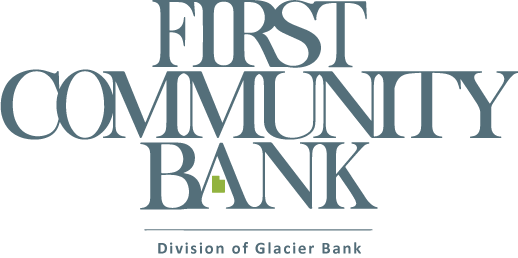Understanding the Basics of Investing in a 401(k)
By Cathryn Jensen| Published January 31, 2024
Interested in investing in a 401(k)…but not sure what it is exactly and where to begin? At First Community Bank we are here to help explain the basics and point you in the right direction. Remember knowledge is power and investing in a 401(k) is an important step to creating a financial future.
So, what is a 401(k)?
A 401(k) is an employer-sponsored defined contribution plan(s) that give employees a tax-advantaged way to save for retirement; your employer may offer a Traditional 401(k) or Roth 401(k) or both. It is recommended that you contribute 10-15% of your income per year, however, if you are unable to contribute that percentage than contribute what you can and start as soon as possible.
In your 401(k) it will be a diversified portfolio made up of mutual funds which include large cap, middle cap, small cap funds, index funds, real estate funds and bond funds. As an employee, you can choose the aggressiveness of your funds, or you can select a preselected funds according to your anticipated year of retirement. Your employer will have a financial broker to manage your funds and your contributions will be automatically deducted from your paycheck.
What are the benefits of investing into a 401(k)?
There are two types of 401(k)s that your company may offer: a Traditional 401(k) or a Roth 401(k) or they may offer both. A Traditional 401(k) contributions are made with pre-tax dollars which reduces your taxable income in that year of contribution. The money grows tax deferred, meaning you don’t pay taxes on it until you withdraw an amount during retirement, and it is taxed as ordinary income. This type of 401(K) is ideal for those who anticipate being in a lower tax bracket during retirement.
A Roth 401(k) contribution are made with after tax dollars, so they don’t reduce taxable income in the year of contribution. The money grows tax free and qualified withdrawals in retirement, including earnings, are tax free. This type of 401(k) is for those who expect to be in a higher tax bracket during retirement or want tax free withdrawals.
Some employers will match the amount of your contribution and or they will provide profit sharing toward your 401(k) and they may offer both options. Your employer may offer a certain percentage match, or a tiered percentage based on your contribution. This is like free money and a wonderful benefit to building financial security.
How much can be contributed?
For 2023, the most one could contribute to a 401(k) was $22,500. For 2024, the IRS has increased the contribution to $23,000. If one is over 50 years old, one can invest an additional $7500, and you can contribute to 2023 until the 2024 tax deadline.
It was once stated that individuals could not contribute after the age of 70.5 years old, but the law has changed that if one is working, one can continue to contribute to their 401(k)s and mandatory distributions are deferred.
Another advantage is that if an employee is having financial trouble, it is helpful to have your money in a 401(k) that creditors may not have access to. Traditional and Roth 401(k)s offers excellent creditor protection. Legally, your plan belongs to the company, and it becomes difficult for the IRS to place a lien on the account. However, depending on the plan you choose, the IRS does have the right to seize your retirement account.
What are the disadvantages of investing into a 401(k)?
There are very few disadvantages, however the point of investing is to plan for your future and what better way than taking advantage of what your company is offering as a benefit to their employees. One of the disadvantages noted is that if you need to withdraw funds before you reach 59.5 years old you will have to pay a 10% early-withdrawal penalty fee as well as pay for any applicable taxes. Depending upon your plan if you retire from your work, you will be required to start taking minimum distributions from your plan after you reach a certain age.
Another disadvantage is that some people want to have more options than what the employers 401(k) might offer and you won’t be able to avoid the investments fees.
The Bottom Line
Don’t wait until you have money to invest. Talk to your HR Department and start now. Plan for your future because in the end you will be glad that you did.
